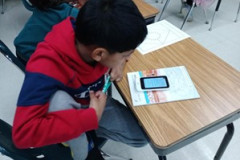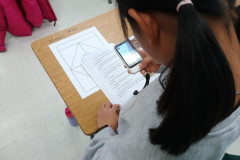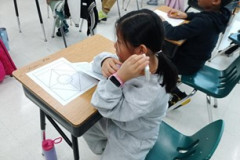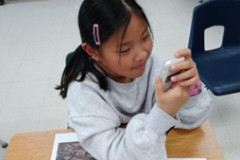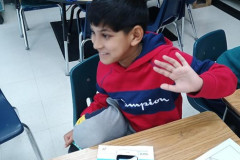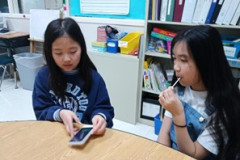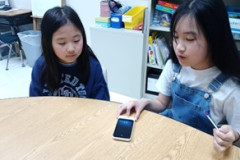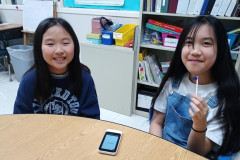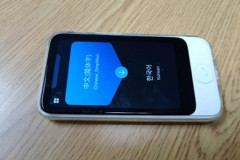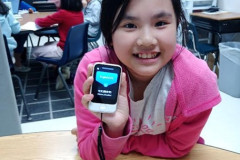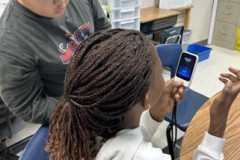Imagine being eight years old, walking into a classroom where you don’t understand the words on the board, the instructions from your teacher, or the jokes your classmates are sharing. You want to learn, to belong, to connect—but everything feels unfamiliar and overwhelming. Now imagine someone handing you a small device that suddenly makes things make sense. With the click of a button, you can read stories, solve math problems, and even talk with new friends. It’s not just a translator—it’s a lifeline. For our emergent multilingual learners at Barkstall Elementary, Pocket Talk devices are giving comfort, confidence, and the courage to participate. They’re helping kids feel seen, supported, and safe—just as every child should.
Thanks to our generous CUSF donors, Barkstall Elementary is harnessing the power of Pocket Talk translators to support their emergent multilingual learners. Submitted by educators Heather Winters and Jayna Caroline-Morgan, the grant funded devices that translate both text and speech—making a meaningful impact in students’ daily learning and social experiences.
How they are being used EVERYDAY to make a difference in the lives of our students:
- Fifth graders HongYi and Mel share a Pocket Talk throughout the day. He speaks Mandarin. She speaks French. They are both literate in their first languages. The translator will take pictures of English text and translate it into their first languages. This allows them to participate throughout the day in their classroom when they don’t have MLL support.
- Yewon and Baibhav are 3rd graders. They each use a Pocket Talk. They are also literate in their first languages. She speaks Korean. He speaks Japanese. Here they are using the Pocket Talks to translate text in their CKLA readers. This helps them to understand the story and complete a graphic organizer about the text.
- Baibhav is engaged in the activity. He is using the English he knows to talk to Yewon. He really enjoys the Pocket Talk.
- Yewon is taking a picture of the CKLA text.
- Yewon is reading the Korean translation. I asked her what she understood. She told me in English that the brother and sister in the story were playing a “missing game.” She said in English she plays games with her brother too.
- Olivia is a fourth grader. She speaks Mandarin and is literate in her first language. She also uses the Pocket Talk to make sense of her CKLA text. She told me she really likes to use it in Math, so she can understand the word problems. She loves Math, and the Pocket Talk helps her to show what she knows.
- Jiyu and Olivia are fourth graders and are good friends. Jiyu speaks Korean, and Olivia speaks Mandarin. Jiyu is proficient enough in English that she does not need the Pocket Talk to translate text. However, the girls enjoy speaking to each other in their first languages. The Pocket Talk has a feature which facilitates conversation.
“Those Pocket Talks are really great!”- Jiyu
“It helps me to read books, in Math and in CKLA.” -Yewon
“Before I couldn’t talk to my friends, but now I can talk and participate in class.” -Baibhav told me in Japanese.
“I like it because it’s convenient.” Eunice told me in Mandarin.
The goal is eventually, these students will not need the Pocket Talks. Until then, these translators are helping them to be engaged, feel successful and build confidence in their budding English skills. Thank you CU Schools Foundation supporters and donors for building confidence, community, and safety for these students in Unit 4!


